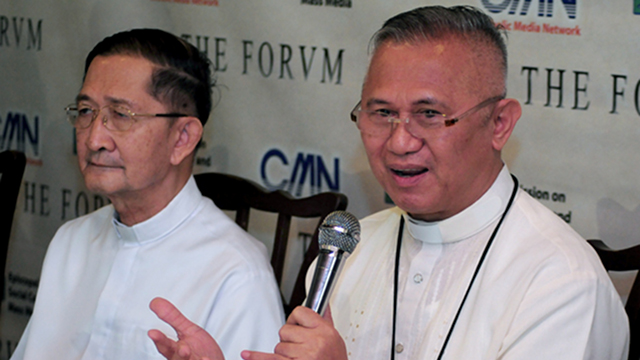SUMMARY
This is AI generated summarization, which may have errors. For context, always refer to the full article.

MANILA, Philippines – This time, they did not mince words in criticizing the Aquino government for its supposed failure to punish the corrupt and help the poor.
Still smarting from their Reproductive Health defeat, Catholic bishops unleashed on Tuesday, January 29, a barrage of criticisms against the Aquino administration, warning Filipinos of “social and political storms” ahead.
In a statement after their bi-annual plenary, the Catholic Bishops’ Conference of the Philippines (CBCP) also asked voters in the May elections to vote for “competent and morally upright candidates who are faithful to their correct and informed conscience.” It’s an obvious reference to politicians who, like the Church, took a stand against the Reproductive Health bill which was signed into law by President Benigno Aquino III last December 2012. The statement thanked lawmakers who were able to resist “the political and financial pressure” that supposedly ensured the passage of the bill.
The statement was released at a press conference on Tuesday, where CBCP official and Antipolo Bishop Gabriel Reyes said that in assessing candidates, those who voted for the RH bill should be marked as unfit for public office. “To me, support for the RH is one of the negative qualities,” Reyes said.
The bishops also urged the Commission on Elections to be more transparent in how the automated elections will be held, saying questions that continue to hound the system have not been fully addressed by the poll body.
Titled “CBCP Pastoral Statement on Certain Social Issues of Today,” the statement cited as key concerns the “promotion of the culture of death and impunity,” the “continuing corruption and abuse of power,” the “widening practice of political dynasties,” the “inability and unwillingness of those in power to take the road of justice,” the “deepening of the culture of impunity,” and the “unabated suffering of the poor.”
The bishops held their bi-annual plenary over the weekend at the Pope Pius XII Center in Manila.
It’s the strongest CBCP statement against the Aquino administration, which is on its third year. Their ties soured after President Benigno Aquino III flexed his political muscle to pass the Reproductive Health bill, which mandates government to finance the distribution of contraceptives. Previous attempts to turn the bill into law were all defeated largely on account of the Church’s political power.
The only positive remark the bishops had of government was on the peace process. Their statement praised “the effort and bold steps taken by the government in pursuing peace in the country.” The Aquino government and the Moro Islamic Liberation Front signed a framework agreement in October 2012, which sets the stage of the creation of the Bangsamoro region.
The CBCP, however, scored the “non-prosecution of alleged perpetrators of corruption” and called on government “to pursue allegations and signs of corruption of power holders not only of the past but also of the present, even of friends and party mates.” A few friends of President Aquino have been linked to various controversies, such as resigned Interior Secretary Rico Puno.
The bishops noted that the government betrayed its campaign against corruption when it did not exert enough effort to push for the approval of Freedom of Information bill which is still pending in the House of Representatives.
Where’s the FOI?
“It is ironic that the government that prides itself of treading the Daang Matuwid fears the Right of Information (FOI) bill because of possible discovery of wrongdoing by public officials. Why are they afraid to entrust the citizens with the truth of their governance?” the statement added.
While “new rights” are introduced, the bishops pointed out that “those in power” have ignored basic social rights. “This has resulted in failure to share the resources in the country to meet basic rights of the poor, such as secure jobs, decent housing, adequate medicine, ownership of lands that they till, and quality education. New ‘rights’ are being pushed while the most basic rights are being ignored!”
Violations of human rights persist under the present administration, the bishops observed. “Extrajudicial killings, unsolved crimes and kidnappings continue, and the government is not able or lacks the political will to prosecute the perpetrators and touch powerful people.”
The bishops downplayed the supposed economic growth trumpeted by the government, noting this has not trickled down to the poor. “Growth itself, that is, more products and more money, should not be the sole aim of development but also equity. The huge gap between the rich and the poor remains. There is little inclusive growth!”
While the government is dead set in implementing the RH law, other laws and policies have been put on the back burner, the statement said. “These include the “CARPER for the farmers, UDHA for the urban poor, IPRA for the indigenous people and the Fisheries Code for the fisher folks. The end of CARPER is only 1½ years away and agrarian reform accomplishment is dismal, being bogged down by bureaucracy, legal technicalities and poor governance.”
Denouncing the existence of political dynasties, the bishops said the system has bred corruption and ineptitude. “We are aggrieved that lawmakers themselves defy the supreme law of the land by not following the mandate of our Philippine Constitution given 26 years ago to make an enabling law to ban political dynasties.”
It added: “Political authority exists for the common good. It is not to be exercised for the sake of private and family interests or simply for the interests of a political party. When political authority is exercised merely for these narrow interests, it betrays the reason for its existence,” the bishops added. – Rappler.com
Add a comment
How does this make you feel?
There are no comments yet. Add your comment to start the conversation.